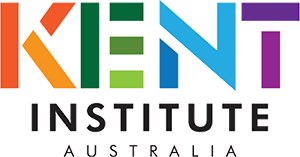Welcome to Kent Institute Australia's Website
Campus
National Code
ICT50220
CRICOS Code
105666G
Course Fees
Start Dates & Intakes
8 January 2024 8 April 2024 8 July 2024 7 October 2024
Study Options
Full time on campus only.
Duration
5 Terms
International Applicants
Yes
The Diploma of Information Technology reflects the role of individuals in a variety of information and communications technology (ICT) roles who have established specialised skills in a technical ICT function.
Individuals in these roles carry out moderately complex tasks in a specialist field, working independently, as part of a team or leading a deliverable with others. They may apply their skills across a wide range of industries, business functions and departments, or as a business owner (sole trader/contractor).
The skills required for these roles may include, but are not restricted to:
Case Studies
Scenarios – Problem Solving, Practical Activities, Oral Presentation, Multiple Choice Quiz, Written Portfolio, Projects, Reports, Practical Observations
ICTICT532 – Apply IP, ethics and privacy policies in ICT environments
BSBCRT512 – Originate and develop concepts
ICTICT517 – Match ICT needs with the strategic direction of the organisation
BSBXCS402 – Promote workplace cyber security awareness and best practices
BSBXTW401 – Lead and facilitate a team
ICTSAS527 – Manage client problems
ICTDBS507 – Integrate databases with websites
ICTWEB519 – Develop complex web page layouts
ICTWEB522 – Develop website information architecture
ICTWEB525 – Implement quality assurance process for websites
ICTPRG554 – Manage data persistence using noSQL data stores
ICTWEB513 – Build dynamic websites
ICTWEB514 – Create dynamic web pages
ICTDMT501 – Incorporate and edit digital video
ICTWEB518 – Build a document using extensible markup language
ICTWEB520 – Develop complex cascading style sheets
CUADIG502 – Design digital applications
ICTPRG553 – Create and develop REST APIs
ICTICT530 – Design user experience solutions
CUAPOS401 – Edit screen content for fast turnaround
ICTDBS507 – Integrate databases with websites
ICTCLD501 – Develop cloud disaster recovery plans
ICTCLD503 – Implement web-scale cloud infrastructure
ICTCLD502 – Design and implement highly-available cloud infrastructure
ICTCLD504 – Improve cloud-based infrastructure
ICTCLD505 – Implement cloud infrastructure with code
ICTCLD506 – Implement virtual network in cloud environments
ICTCLD507 – Build and deploy resources on cloud platforms
ICTCLD508 – Manage infrastructure in cloud environments
ICTCYS407 – Gather, analyse and interpret threat data
ICTCYS613 – Utilise design methodologies for security architecture
ICTCYS610 – Protect critical infrastructure for organisations
ICTSAS524 – Develop, implement and evaluate an incident response plan
ICTSAS526 – Review and update disaster recovery and contingency plans
ICTICT519 – Develop detailed component specifications from project specifications
ICTNPL413 – Evaluate networking regulations and legislation for the telecommunications industry
ICTNWK423 – Manage network and data integrity
ICTNWK541 – Configure, verify and troubleshoot WAN links and IP services
ICTPMG505 – Manage ICT projects
ICTTEN519 – Design network building projects
ICTNWK529 – Install and manage complex ICT networks
ICTNWK536 – Plan, implement and test enterprise communication solutions
ICTNWK540 – Design, build and test network servers
ICTNWK546 – Manage network security
ICTNWK557 – Configure and manage advanced virtual computing environments
ICTNWK559 – Install an enterprise virtual computing environment
ICTSAS512 – Review and manage delivery of maintenance services
ICTSAS518 – Install and upgrade operating systems
ICTDBS507 – Integrate databases with websites
ICTCLD501 – Develop cloud disaster recovery plans
ICTCLD503 – Implement web-scale cloud infrastructure
ICTCLD502 – Design and implement highly-available cloud infrastructure
ICTCLD504 – Improve cloud-based infrastructure
ICTCLD505 – Implement cloud infrastructure with code
ICTCLD506 – Implement virtual network in cloud environments
ICTCLD507 – Build and deploy resources on cloud platforms
ICTCLD508 – Manage infrastructure in cloud environments
ICTSAS512 – Review and manage delivery of maintenance services
ICTSAS518 – Install and upgrade operating systems
ICTICT520 – Confirm transition strategy for a new system
ICTICT521 – Select new technology supported business model
ICTSAS522 – Manage the testing process
Full-time (20 hours per week) using blended mode (face-to-face and supervised study sessions) Note: Excludes Self Study for assessment tasks.
Entry to this course requires:
Applicants from non-English speaking backgrounds only.
Discover the journey and accomplishments of some of Kent’s current students and graduates by exploring their stories in Our Students and Alumni.
Explore more student testimonials at Kent’s Youtube channel.


Conveniently fill in our application forms and send to Kent via email or post.

Prepare and attach all required documents with your application according to Kent's entry requirements.

Successful applicants will receive our Offer of Admission. By paying your tuition fees upon this, you'll receive a Confirmation of Enrolment (COE). Welcome to Kent!
Find out more about studying in Australia with Kent Institute Australia, just call on…

We acknowledge and pay respects to the Elders and Traditional Owners of the land on which our two campuses stand.
Copyright © 2024 Kent Institute Australia Pty Ltd. Website by iOnline.